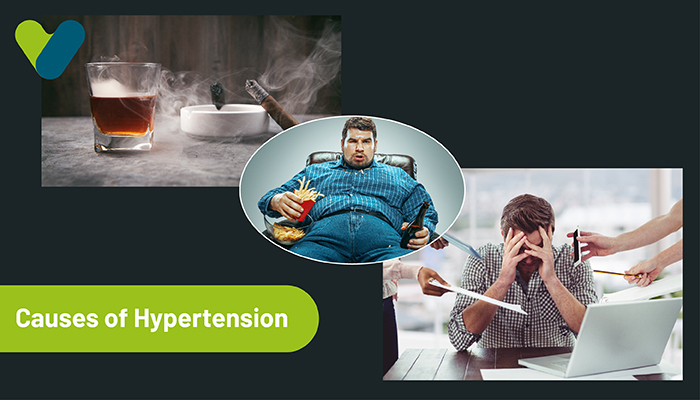Hypertension, or high blood pressure, is a fairly common ailment affecting numerous people globally. Blood pressure refers to the force that blood exerts the walls of the blood vessels by pushing against them in your body. Your heart pumps the blood, causing it to go into the blood vessels, and in turn, the blood vessels carry the blood to all the parts of the body. High blood pressure is considered a dangerous disease because it causes the heart to work harder than normal to pump the blood to circulate it in the body. It also contributes to the development of atherosclerosis (hardening of the arteries), heart attacks, strokes, kidney diseases, and heart failure. Before moving on to what are the causes of high blood pressure, it is important to understand what constitutes hypertension. Blood pressure is measured in units known as mm Hg and is written as a fraction, with the numerator depicting your systolic pressure, and the denominator showing your diastolic pressure. The different levels of blood pressure are shown below: • Normal BP measures at 120 over 80 (120/80) • Elevated BP measures at 120–129/less than 80 • Stage 1 high BP measures at 130–139/80–89 • Stage 2 high BP measures 140 and above/90 and above. • Hypertensive crisis measures at higher than 180/higher than 120, which is when you should seek urgent medical care. In such cases, keep an eye out for the causes of sudden high blood pressure and if you see symptoms like headaches, shortness of breath, nosebleeds, visit a doctor immediately. If your blood pressure is above the normal range, you should consult your doctor to learn more about how you can reduce or manage it.
Top 7 causes of hypertension disorder

Reviewed by: Livlong
122 views
Table of Contents
FAQs:
LivLong - About the Author
Livlong 365 is a trusted digital healthcare platform committed to making quality health and wellness services accessible, affordable, and user-friendly for every Indian. Through our informative and educational blogs, we aim to empower individuals with accurate health knowledge, preventive care tips, and expert-backed insights to help them lead healthier, more informed lives.
Tags: Diseases
Relevant Articles

Diet for diarrhoea relief
February 8, 2023
When you have diarrhoea – frequent loose and watery stools – being mindful of what you are eating throughout the day can make a big difference to your...

Vitiligo Surgery Cost: Vitiligo Laser Treatment Price in India
February 10, 2023
Many people who know about the condition vitiligo understand that the condition does not hinder any other aspect of the life of a person with vitiligo...